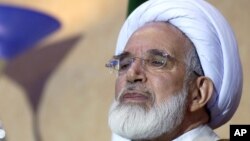Iranian authorities have eased restrictions on detained opposition cleric Mehdi Karroubi, who helped lead big anti-government protests in 2009 and was put under house arrest two years later, his son said on Sunday.
Karroubi, a defeated candidate in disputed presidential elections in 2009, was moved from detention at a location in Tehran to his home in the capital's northern Jamaran area, his son, Mohammad Hussein Karroubi, said on his Facebook page.
Opposition sources have said Karroubi had been held at a apartment in northern Tehran operated by the security services. There has been no official comment on those reports.
The transfer relaxes curbs imposed for what critics saw as his seditious role, along with fellow prominent reformist Mirhossein Mousavi, in post-election protests in 2009.
It comes as Iranian President Hassan Rouhani, who was elected in June on a pledge to end Tehran's isolation and win some relief from sanctions, is ushering in a thaw in ties with the West after years of confrontation and hostile rhetoric.
Karroubi and Mousavi, now in their 70s and in ill health, led the "Green Movement" that disputed the presidential poll that returned Rouhani's predecessor, Mahmoud Ahmadinejad, to office, and protests broke out across Iran.
Karroubi and Mousavi, who also contested the 2009 polls, have in effect been held under house arrest since February 2011, when they called for a rally in support of protests that were sweeping countries in the Arab world.
They have never been charged with any crime.
"He was finally transferred to his private home in Jamaran only hours ago," Karroubi's son Mohammad Hussein said.
He added that his father was now being held in his family's second floor apartment, and security forces had taken up residence in a property on the first floor.
Mohammed Hussein said in remarks to the ISNA news agency his father's living conditions had improved in recent weeks and he had been allowed regular weekly visits at the location where he had been detained.
Nevertheless his father still faced a number of restrictions, he said without elaborating. "During the past eight months, my father has had four surgeries due to the poor condition of his detention centre," he said.
He said his father, a former parliament speaker and once a close aide to late revolutionary leader Ayatollah Ruhollah Khomeini, still demanded a fair trial over his role in the 2009 protests.
At least 27 people were killed and hundreds jailed in a violent state crackdown on the 2009 unrest, the largest opposition demonstrations since the 1979 Islamic Revolution.
Karroubi, a defeated candidate in disputed presidential elections in 2009, was moved from detention at a location in Tehran to his home in the capital's northern Jamaran area, his son, Mohammad Hussein Karroubi, said on his Facebook page.
Opposition sources have said Karroubi had been held at a apartment in northern Tehran operated by the security services. There has been no official comment on those reports.
The transfer relaxes curbs imposed for what critics saw as his seditious role, along with fellow prominent reformist Mirhossein Mousavi, in post-election protests in 2009.
It comes as Iranian President Hassan Rouhani, who was elected in June on a pledge to end Tehran's isolation and win some relief from sanctions, is ushering in a thaw in ties with the West after years of confrontation and hostile rhetoric.
Karroubi and Mousavi, now in their 70s and in ill health, led the "Green Movement" that disputed the presidential poll that returned Rouhani's predecessor, Mahmoud Ahmadinejad, to office, and protests broke out across Iran.
Karroubi and Mousavi, who also contested the 2009 polls, have in effect been held under house arrest since February 2011, when they called for a rally in support of protests that were sweeping countries in the Arab world.
They have never been charged with any crime.
"He was finally transferred to his private home in Jamaran only hours ago," Karroubi's son Mohammad Hussein said.
He added that his father was now being held in his family's second floor apartment, and security forces had taken up residence in a property on the first floor.
Mohammed Hussein said in remarks to the ISNA news agency his father's living conditions had improved in recent weeks and he had been allowed regular weekly visits at the location where he had been detained.
Nevertheless his father still faced a number of restrictions, he said without elaborating. "During the past eight months, my father has had four surgeries due to the poor condition of his detention centre," he said.
He said his father, a former parliament speaker and once a close aide to late revolutionary leader Ayatollah Ruhollah Khomeini, still demanded a fair trial over his role in the 2009 protests.
At least 27 people were killed and hundreds jailed in a violent state crackdown on the 2009 unrest, the largest opposition demonstrations since the 1979 Islamic Revolution.





